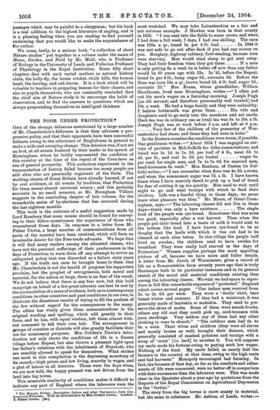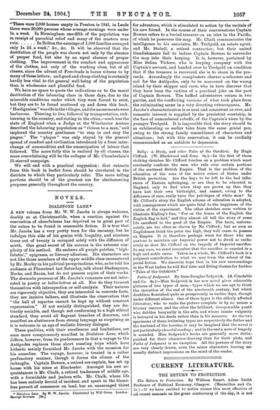ONE of the strange delusions entertained by a large number
of Mr. Chamberlain's followers is that they advocate a pro- gressive policy, and that their opponents have been successful hitherto owing to the reluctance of Englishmen in general to make a wide and sweeping change. This delusion was, if not set on foot, at all events fostered by their leader in his speech at Birmingham, where he boldly represented the condition of this country at the time of the repeal of the Corn-laws as one of general prosperity. This audacious experiment in the transmutation of history failed because too many people are still alive who are personally cognisant of the facts. The working classes of Great Britain have already learned, if not by oral evidence, at all events by tradition, that Protection for them meant almost universal misery ; and this probably accounts in no small measure, as Mr. Brougham Villiers suggests in the concluding chapter of this volume, for the remarkable series of by-elections that has occurred during the last eighteen months.
This book is the outcome of a useful suggestion made by Lord Rosebery that some means should be found for convey- ing to their fellow-countrymen the experience of those who remembered those days. In response to a letter from Mr. Fisher Unwin, a large number of communications from all parts of the country have been received, which will form an invaluable dossier for the Free-trade advocate. We hope that it will find many readers among the educated classes, who have not the personal sufferings of their predecessors in the days of Protection to warn them off any attempt to revive an antiquated policy that was discarded as a failure sixty years ago. If the truth can once be brought home to them that Mr. Chamberlain is not the herald of progress his supporters proclaim, but the prophet of retrogression, both moral and material, for the nation at large, there is no fear of the result. We do not believe that there is any fear now, but this bold campaign on behalf of a few great interests can best be met by the accumulation of a mass of evidence, both as to contemporary conditions in other countries and past conditions in our own, to illustrate the disastrous results of trying to fill the pockets of the few without regard for the consequences to the many. The editor has wisely given these communications in the original wording and spelling, which add greatly to their force, and he has, with equal wisdom, left them almost with- out comment to tell their own tale. The arrangement in groups of counties or districts will also greatly facilitate their use for missionary purposes. Mrs. Cobden's Unwin's intro- duction not only shows the conditions of life in a Sussex village before Repeal, but also throws a pleasant light upon her father's relations with the inhabitants of Heyshott, who are sensibly allowed to speak for themselves. What strikes one most in this compilation is the depressing monotony of its record,—high prices and low living, scarcity in wages, and a glut of labour in all districts. Those were the days when, we are now told, the happy peasant was not driven from the land into big towns.
This miserable similarity of conditions makes it difficult to indicate any part of England where the labourers were the
• The Hungry Forties: Descriptive Letters and other Te.stinioniss from Con- temporary Witnesses. With an Introduction by Kra. Cobden Unwin. London : T. Wisher thnfin. [65.] most wretched. We may take Leicestershire as a fair and not extreme example. J. Hawker was born in that county. in 1836. " I was sent into the fields to scare crows, and when I had done a full week, 7 days, I had one shilling. The corn was 105s. a qr., bread ls. per 4 lb. loaf In 1844 it was not safe to go out after dark if you had any money on you. Burglary, highway robbery, fowl-stealing, because men were starving. Men would steal sheep to get sent away..
They had their freedom when they got there If a man is only getting 6s. a week he is better off now than any father would be 60 years ago with 23s. In '45, before the Repeal, bread ls. per 4 lb., lump sugar 9d., currants 6d. Before the Boer war corn 16s. a qr., brown bread 3d. 4 lb. loaf, sugar 2d., currants 2d." Mrs. Evans, whose grandfather, William Shorthouse, lived near Birmingham, writes :—"I often put out his men's wages on a Saturday morning. Joseph Pugh [an old servant, and therefore presumably well treated] had 10s. a week. He had a large family and they were unhealthy.
I believe buttermilk was given them His wife and daughters used to go early into the meadows and eat snails. Herb tea was in ordinary use as (real) tea was 5s. to 10s. a lb. Joseph Pugh was at work before 5 a.m. and left at 6 p.m.
Very few of the children of the peasantry of Wor- cestershire had shoes, and those they had were in holes." In the Eastern counties the conditions were worse, if possible. One gentleman writes :—" About 1834 I was engaged on sur- veys of parishes in Mid-Suffolk for tithe-commutations, and bread was ls. ld. to ls. 2d. per loaf of 4 lb., meat 3d. to 4d. per lb., and coal ls. 3d. per bushel wages Gs. per week for single men, and 7s. to 7s. 6d. for married men, head-horsemen 9s. week." Mrs. Banham, of Caston (in Suf- folk) writes :—" I can remember when flour was 4s. 3d. a stone, and when the commonest sugar was 7d. a lb. I have known times when I have scarcely dared to pick up a loaf of bread for fear of cutting it up too quickly. Men used to wait until night to go and steal turnips with which to feed their children. Life was a fearful thing in those days; we never knew what pleasure was then." Mr. Moore, of Great Orem- ingham, says :—" The labouring classes did not live in those days—theirs was only a bare existence The staple food of the people was rye-bread. Sometimes that was none too good, especially after a wet harvest. Then when the people put their bread into a basin of milk it would sink to the bottom like lead. I have known rye-bread to be so doughy that the knife with which it was cut bad to be cleaned at each elite taken. In this village the people half lived on swedes; the children used to have swedes for breakfast. They were really half starved in the days of Protection." Wessex supplies perhaps the most appalling picture of all, because we have more and fuller details. A letter from Mr. Jacob, of Warminster, gives a record of life on a Somersetshire farm seventy years ago that is truly Dantesque both in its particular instances and in its general sketch of the moral and material conditions existing then among the labouring classes. We wish we had space to repro- duce in full this remarkable exposure of " protected " England which covers several pages. " Our indoor men received from 2s. to 2s. 6d. per week. They wore a doulis ' shirt, bare breast winter and summer. If they had a waistcoat, it was generally made of lambskin or moleskin. They used to pre- serve the skins of moles. Some of them wore smock-frocks, others any old coat they could pick up, cord-trousers with yarn stockings. Very seldom any of them had any other clothing to wear to church." " The outdoor men had 6s. to 8s. a week. Their wives and children (they were all slaves and mostly brutes as well) brought their dinners, which generally consisted of mashed potatoes and turnips with a scrap of ' must' [i.e. lard] to moisten it. You will suppose my uncle made his fortune owing to paying such low wages. Nothing of the kind. My uncle failed, as nearly half the farmers in the country at that time, owing to the high rents and bad harvests." Monopoly encouraged bad farming. In fact, the farmers of that day, so far as the comforts and refine- ments of life were concerned, were no better off in comparison with their successors than the labourers were. This was made clear in the Spectator about a year ago by quotations from the Reports of the Royal Commission on Agricultural Depression in the "forties."
The story from the big towns is more scanty in material, but the same in substance. Mr. Ashton. of Leeds, writes
"There were 2,000 houses empty in Preston in 1841, in Leeds there were 20,000 persons whose average earnings were under ls. a week. In Birmingham one-fifth of the population was in receipt of parochial relief and many of the masters near
ruin In Bolton the earnings of 1,000 families averaged only Is. 2d. a week," &c., &c. It will be observed that the destitution of the people was shown not only by the absence of proper food, but also by an equal absence of proper clothing. The improvement in the comfort and appearance of the clothes, not only of the working class, but of all classes, since the advent of Free-trade is borne witness to by many of these letters ; and good and cheap clothing is certainly hardly less vital to the general well-being of the population than is wholesome and plentiful food.
We have no space to quote the indications as to the moral destitution of the labouring class in those days, due to the miserable conditions under which they were forced to exist, but they are to be found scattered up and down this book. " Hooliganism" was rife in the villages, and the amusements were barbarous. Thieving to live, followed by transportation, rick- burning in the country, and rioting in the cities,—such was the state of England when a Judge at the Winchester Assizes described the labouring population as "vicious to a man," and implored the country gentlemen "to step in and stay the plague." The " plague " was only stayed by the general spread of comfort and civilisation introduced by a freer inter- change of commodities and the emancipation of labour that followed. The more fully this is realised by all classes, the more overwhelming will be the collapse of Mr. Chamberlain's ill-starred campaign.
We will end with a practical suggestion : that extracts from this book in leaflet form should be circulated in the districts to which they particularly refer. The more telling portions should be of the greatest use for electioneering purposes generally throughout the country.



































 Previous page
Previous page